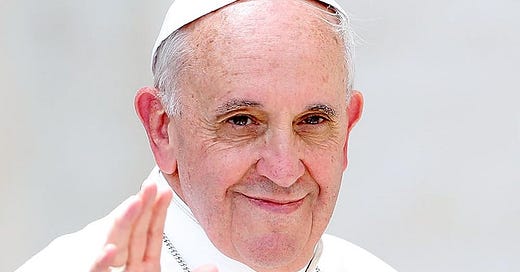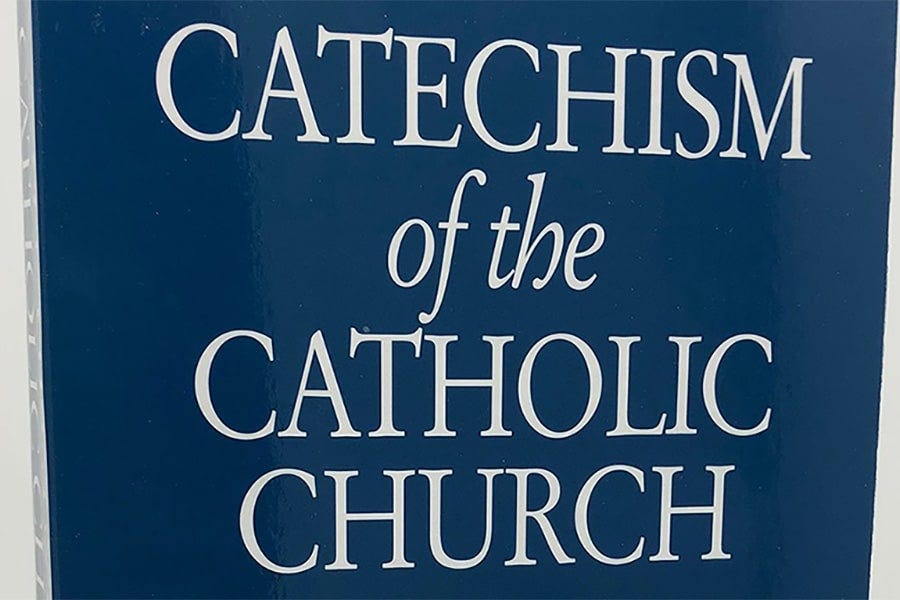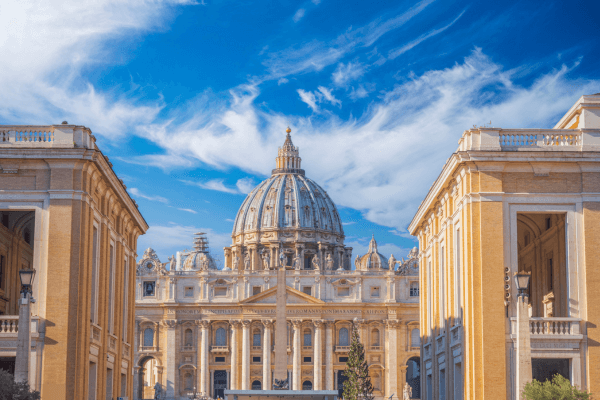Pope Francis Wasn't "Inclusive." He Was Catholic.
The Catholic Church Isn't Socio-Political, It Is Salvific.
I came across some rather ridiculous articles in secular media about how concerned some commentators and their ilk are that the “right wing” “conservative” cardinals will move the Church away from the clearly “progressive, inclusive” direction and papacy of Francis, now that Francis has passed on. They are afraid that the death of Francis will be the occasion when the right-wing conservatives in the Church will seize power and send the Church back into what they believe are the archaic cobwebs of antiquity.
In today’s ideological landscape, words like “inclusive” are often wielded as ideological litmus tests. But when these secular categories are applied to the Body of Christ, the Church, the result is always confusion rather than clarity. Before evaluating Pope Francis under the banner of inclusivity, we need to caution against superimposing modern political and idealogical terms onto ecclesial structures and doctrines that are not only older but fundamentally different in nature because they are divinely revealed. There’s a real hubris and absurdity at play here if one attempts to do so. The Church is not a political movement. It is not a social justice NGO. It is not even a democratic or republican institution. It is, as the very Word of God testifies, the Mystical Body of Christ (cf. 1 Corinthians 12:27), and its teachings are not malleable to cultural trends because they are perennial inasmuch as the God who reveals them is Himself eternal.
The Secular Definition of “Inclusivity”
To assess the question fairly, we must first define what “inclusivity” means in secular and progressive discourse. Typically, the term refers to the intentional welcoming and equal treatment of all people, regardless of their background, identity, behavior, or beliefs. This sounds positive, until one realizes that this vision means a complete acceptance and validation of all the moral life choices that they espouse, even if they are patently immoral. This vision of inclusivity does not require conformity to any particular moral standard. In fact, it often insists that all beliefs and lifestyles be affirmed and celebrated. Inclusivity in this sense is about eliminating distinctions, hierarchies, and normative judgments—particularly moral ones.
Inclusivity under this framework means making no demands of personal change for conversion and growth in virtue and holiness, viewing all ways of life as equally valid, and erasing lines that distinguish one worldview or behavior from another. As journalist Douglas Murray put it, this kind of inclusive culture “lives in terror of being seen as judgmental,” even when judgment is necessary for truth or moral coherence (The Madness of Crowds, 2019).
Why the Catholic Church Can Never Be Inclusive by That Standard
Given this definition, the Catholic Church cannot—indeed, must not—be “inclusive.” It draws essential distinctions between good and evil, truth and error, virtue and vice. Jesus Himself did not preach moral relativism. He preached repentance: “Go, and sin no more” (John 8:11). His welcome was radical, but so were His demands.
The Catechism of the Catholic Church explicitly affirms this moral structure: “There are acts which, in and of themselves, independently of circumstances and intentions, are always gravely illicit by reason of their object” (CCC 1756). That’s a non-negotiable, concrete, moral framework—one that modern inclusivity cannot and will not tolerate.
Even canon law reflects this. Membership in the Church is not merely about self-identification but about belief, practice, and obedience. Canon 209 §1 says: “The Christian faithful, even in their own manner of acting, are always obliged to maintain communion with the Church.” This includes adhering to doctrine and accepting ecclesial discipline.
In short, the Church is not inclusive in the way the secular world demands because it maintains a clear moral and doctrinal identity. Simply put, one cannot be a believer in Christ if one is unwilling to follow the life of Christ. As then-Cardinal Joseph Ratzinger once wrote: “The Church is tolerant precisely because she believes in the existence of truth. She does not impose it but proposes it” (Truth and Tolerance, 2003). The key word here is “propose.” The Church offers the truth, but she does not bend it to suit individual preferences, in any and all circumstances.
Pope Francis: The Perception vs. the Reality
Pope Francis has often been hailed by secular media as a revolutionary, an ally of progressive causes, and a beacon of inclusivity. Headlines like “Pope Francis: Who Am I to Judge?” (CNN, 2013) fueled this narrative. But those who read the Pope’s full statement, or who follow his teaching more carefully, and who ground themselves in magisterial truth, know the media image diverges significantly from reality.
When Pope Francis uttered that now-famous line, he was responding to a question about a priest with a homosexual orientation who had reportedly lived a chaste life. The full quote was: “If someone is gay and he searches for the Lord and has good will, who am I to judge?” This was not a blank check for any lifestyle or moral choice; it was an expression of pastoral sensitivity toward a person striving for virtue and holiness, to the best of the Holy Father’s estimation.
Francis has consistently upheld Catholic moral teaching, with an emphasis on mercy and accompaniment, often to significant ambiguity, but he has never veered from perennial doctrine. In his apostolic exhortation Amoris Laetitia, he reaffirmed traditional Church teaching on marriage: “The indissolubility of marriage… should not be viewed as a ‘yoke’ imposed on humanity, but as a ‘gift’ granted to those who are joined in marriage” (AL 62). Elsewhere he wrote: “There can be no confusion between a family willed by God and every other kind of union” (AL 251).
He has condemned gender ideology in blunt and no uncertain terms. In 2016, Francis said it was “terrible” that children were being taught they could choose their gender and called it “ideological colonization.” Much to the horror of moral relativists and progressivists, he even compared the normalization of gender fluidity to nuclear arms: “Today children—children!—are taught in school that everyone can choose his or her sex. Why are they teaching this? Because the books are provided by the persons and institutions who give you money. These forms of ideological colonization are also supported by influential countries” (Pope Francis, 2016 in Poland).
Even in Fiducia Supplicans (2023), which allowed for non-liturgical blessings of individuals in irregular unions and caused an immense global stir, the document was clear: “This blessing should never be imparted in concurrence with a civil union, and not even in connection with a wedding celebration” (Fiducia Supplicans, 30). It reaffirmed that these unions are in no way morally equivalent to marriage and do not receive any form of formal liturgical approval.
So why the confusion? Because Pope Francis has prioritized tone over terminology, which has resulted in 12 years of frequent ambiguity. He often spoke in pastoral and colloquial language, leaving his words open to misinterpretation, which the global media pounced upon. His efforts at dialogue and openness were mistaken for doctrinal softness or laxity. Should he have done better? Absolutely! He is the Holy Father, and the office brings with it a tremendous amount of global scrutiny and criticism. Such ambiguity can incite global confusion, and often did. Did we all hope for more doctrinal clarity? Undoubtedly! He was, nonetheless, our Holy Father, and we embraced him and we loved him. Because, and let’s make very clear here: openness to individuals is not the same as openness to sin and error. Francis never changed Church teaching on morality because he couldn’t have, and therefore, he wouldn’t have.
A Church That Welcomes—but Requires Conversion
The heart of Christianity is a seeming paradox: the welcome of grace and the demand for repentance. The two necessarily go hand in hand. Jesus welcomes sinners—but never sins. The Gospel is inclusive in its invitation but exclusive in its demands. “Enter through the narrow gate,” Jesus says, “for the gate is wide and the road broad that leads to destruction” (Matthew 7:13).
In this sense, Pope Francis is profoundly not inclusive—if inclusivity means affirming everyone as they are without requiring moral transformation. Time and again, Francis has insisted on the need for conversion. “The call to conversion… is an essential dimension of the Christian life,” he said during a general audience in 2021. “It is a journey of purification, of inner renewal, a path that requires effort and commitment.”
He has preached against relativism, lamenting a culture that “believes that everything is of equal value.” In his 2013 encyclical Lumen Fidei, co-authored with Benedict XVI, Francis writes: “Today we can speak of an ‘ecumenism of hate’ in the face of fundamentalism, but we must also recognize an ‘ecumenism of indifference’—a common idea that truth is relative and optional. This erodes the foundation of faith.”
The Church’s true inclusivity is not about affirming all paths—that would be eternally destructive for the soul validated to continue living in moral evil. The Church’s open invitation is about calling all people to the path: Jesus Christ. As St. Paul wrote: “Do not be conformed to this world, but be transformed by the renewal of your mind” (Romans 12:2). The Gospel call is universal, but it is also radical.
The Biblical Invitation: Come and Be Changed
Christianity begins with an invitation—but it ends with a transformation. Jesus says, “Come to me, all you who labor and are burdened, and I will give you rest” (Matthew 11:28). But He also says: “Be perfect, as your heavenly Father is perfect” (Matthew 5:48). The embrace of Christ is open to all, but remaining in that embrace means doing the will of the Father, and taking up your cross daily (Luke 9:23).
The Church is not a club of moral elites, but a hospital for sinners. Yet like any hospital, it has rules, medicine, and a diagnosis. Sin is real, and healing requires change. We cannot choose to persist in the very poison that we also claim seek healing for. “You were washed, you were sanctified, you were justified in the name of the Lord Jesus Christ,” Paul tells the Corinthians (1 Corinthians 6:11)—but only after listing a catalogue of sins from which they had been delivered.
This is the scandal of true Christianity: it both welcomes the person and judges the soul, it both includes the individual and excludes moral evil. Not because it is cruel, but because it is honest, and true love necessitates honesty. Grace is free, but it is not cheap.
A Different Kind of Welcome
To call Pope Francis “inclusive” in the secular sense is to deliberately mislabel both him and the Church he leads. He is pastoral, yes. Merciful, certainly. But never at the expense of truth. His vision of inclusivity is not the world’s version. It is the Gospel’s: a radical hospitality that calls for holiness.
The Catholic Church will never be fully inclusive by modern standards, because it belongs to a different order of reality because its goal is not affirmation but salvation. Its hope is not in consensus but in Christ, and the door to that hope is always open—but it is a narrow one. Therefore, much to the chagrin of the virtually inestimable “progressives” across the world, Pope Francis didn’t change either the doctrine or the direction of the Church. Because he couldn’t. No one can. The Church has one direction: Heavenward. She has one compass: her divine bridegroom. Popes are merely helmsman guiding the barque.
As G.K. Chesterton once said: “The Church is the only thing that frees a man from the degrading slavery of being a child of his age.” Therefore, inclusivity that demands conformity to the world is not freedom—it’s just another form of bondage to evil. True freedom is the right to be changed by love, formed by truth, and lifted by grace.
That is the kind of “inclusion” Pope Francis has preached. And that is the only “inclusion” that can save.
Sources:
Catechism of the Catholic Church (1756)
Pope Francis, Amoris Laetitia (2016)
Pope Francis, Fiducia Supplicans (2023)
Pope Francis, Audience Address (Feb 2021)
Pope Francis, World Youth Day, Poland (2016)
Pope Francis and Benedict XVI, Lumen Fidei (2013)
Joseph Ratzinger, Truth and Tolerance (2003)
Douglas Murray, The Madness of Crowds (2019)
Holy Bible, New American Bible Revised Edition








As I was reminded in a homily on Monday, Pope Francis didn't change church teaching. Rather, he reminded us that we must live Church teaching out in our daily lives. Sometimes, that means getting out of our comfort zone to embrace those that our instinct tells us we'd rather not. Thanks for the continued insight, Marcus.